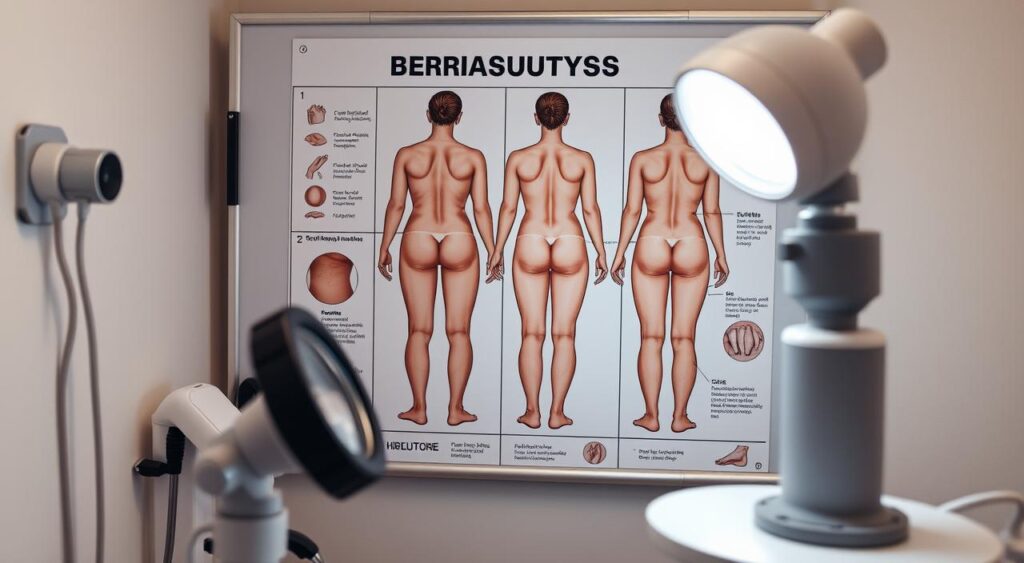Learn about hirsutism, the medical term for excessive hair growth in women. Understand the causes, symptoms, and available treatments.
Hirsutism: This condition means they grow too much hair, especially on their face, chest, and back. It can make women feel bad about themselves and affect their happiness.
Hirsutism often shows there’s a problem with hormones. Knowing what causes and shows hirsutism is key.

Hirsutism is a common problem that makes many women feel sad and worried. It’s important to know the signs like too much hair, acne, and irregular periods. This way, women can get help and feel better about how they look.
Key Takeaways
- Hirsutism affects 5-10% of women in the United States
- Excessive hair growth is a common symptom of hirsutism
- Hirsutism can be a source of distress and low self-esteem
- Hormonal imbalances are often the underlying cause of hirsutism
- Early diagnosis and treatment can help manage hirsutism and its symptoms
- Understanding the causes and symptoms of hirsutism is crucial for effective management
Understanding Hirsutism and Its Impact
Hirsutism is when women grow too much body hair, often because of hormone imbalances. It’s caused by a mix of genetics, hormones, and environment. To manage hirsutism, we need to look at both physical and emotional sides.
People with hirsutism see hair grow in places like the face, chest, and back. This can make them feel shy and hurt their self-esteem. It affects how they live and interact with others.
Definition and Clinical Presentation
Hirsutism is diagnosed by too much hair, acne, and irregular periods. It shows up when androgen hormones go up. This can happen for many reasons.
Common Areas of Hair Growth
The most common places for hirsutism are:
- Face, especially the chin, upper lip, and eyebrows
- Chest and breasts
- Back and shoulders
- Abdomen and buttocks
Psychological and Social Effects
Hirsutism can really hurt a person’s feelings. It can make them feel embarrassed, anxious, and sad. It’s important to manage hirsutism to improve their life and feel better.
Common Causes of Excessive Hair Growth
Excessive hair growth is a sign of hirsutism, often caused by hormonal imbalance and hirsutism. It can be triggered by genetics, hormonal changes, and some medical conditions. Knowing what causes hirsutism is key to finding good treatment options for hirsutism.
Here are some common reasons for too much hair:
- Genetic predisposition: Family history matters a lot in hirsutism.
- Hormonal imbalance: Changes in androgen levels can cause more hair.
- Polycystic ovary syndrome (PCOS): A common disorder that leads to hirsutism.
Seeing a healthcare professional is important. They can find the cause of hirsutism and create a treatment plan. This way, people can find treatment options for hirsutism and manage their symptoms.

For some, hormonal imbalance and hirsutism can be managed by lifestyle changes. This includes staying healthy, exercising, and eating well. But, for severe cases, medical help might be needed to fix hormonal issues and stop too much hair growth.
| Cause | Description |
|---|---|
| Genetic predisposition | Family history of hirsutism |
| Hormonal imbalance | Fluctuations in androgen levels |
| Polycystic ovary syndrome (PCOS) | Common endocrine disorder |
Medical Conditions Associated with Hirsutism
Hirsutism is often linked to various medical conditions that affect hormone levels in the body. One of the most common conditions associated with hirsutism is Polycystic Ovary Syndrome (PCOS). PCOS is a hormonal disorder that causes enlarged ovaries with small cysts on the outer edges. This leads to an imbalance of hormones, including androgens, which can contribute to excessive hair growth.
Other medical conditions, such as adrenal gland disorders, can also contribute to the development of hirsutism. These disorders affect the adrenal glands, which produce hormones, including androgens. An imbalance of these hormones can lead to hirsutism and other symptoms. Natural remedies for hirsutism may help alleviate symptoms, but it’s essential to consult a healthcare professional for proper diagnosis and treatment.
Common Medical Conditions
- Polycystic Ovary Syndrome (PCOS)
- Adrenal gland disorders
- Hormonal imbalances
Understanding the relationship between hirsutism and PCOS is crucial for effective management.
| Medical Condition | Symptoms | Treatment Options |
|---|---|---|
| PCOS | Excessive hair growth, acne, weight gain | Hormonal therapy, birth control pills, lifestyle changes |
| Adrenal gland disorders | Excessive hair growth, acne, high blood pressure | Medications to regulate hormone production, surgery |
In conclusion, hirsutism is often associated with underlying medical conditions, such as PCOS and adrenal gland disorders. By understanding these conditions and their relationship with hirsutism, individuals can seek proper diagnosis and treatment. This includes natural remedies for hirsutism, to manage their symptoms and improve their overall quality of life.
Diagnosing Hirsutism: What to Expect
Diagnosing hirsutism means a detailed medical check to find the causes of hirsutism. It’s when women grow too much hair. This can show a hormonal imbalance or another health issue.
The first step is a physical check and talking about your health history. Doctors look for signs of excessive hair growth. They ask about your menstrual cycle, family health, and any medicines you take.

At times, more tests are needed to find the root cause. This might include blood tests for hormone levels or imaging to check for other health issues. Knowing the causes of hirsutism helps create a good treatment plan. This plan aims to control excessive hair growth and any symptoms.
Some key signs of hirsutism include:
- Too much hair on the face, chest, or back
- Irregular periods or trouble getting pregnant
- Acne or other skin problems
- Hormonal imbalances or thyroid issues
Getting a correct diagnosis is key to managing hirsutism. It helps address any underlying health problems. By understanding the causes of hirsutism and tailoring a treatment, people can better manage excessive hair growth. This improves their overall well-being.
Medical Treatment Options
For those dealing with hirsutism, there are many medical treatments available. These treatments aim to fix the hormonal imbalance that leads to too much hair growth.
It’s key to know the different ways to treat hirsutism. Options include oral meds, topical treatments, and hormone therapy. Each can help lessen hirsutism symptoms and balance hormones.
Oral Medications
Oral meds, like birth control pills, can balance hormones that cause hirsutism. They work by lowering androgen levels. Androgens are hormones that make hirsutism worse.
Topical Treatments
Topical treatments, like creams or gels, slow hair growth in specific areas. They’re often used with other treatments for the best results.
Hormone Therapy
Hormone therapy is another option, especially for those with hormonal imbalances. It involves taking meds to control hormone levels. This can reduce too much hair growth caused by hirsutism and hormonal imbalance.
Exploring these medical treatments can help manage hirsutism and hormonal imbalance. This way, people can find a solution to reduce excess hair.
Hair Removal Methods and Management
Managing hirsutism symptoms, like too much body hair, is key for those affected. There are many ways to remove hair and ease the discomfort it causes. It’s important to look at both short-term and long-term solutions.
Short-term fixes, like waxing and shaving, can quickly reduce body hair. But, they need to be done often, which can be a hassle. Long-term options, like laser hair removal, offer a lasting solution, cutting down on the need for frequent treatments.
Temporary Solutions
- Waxing: removes hair from the root, providing smoother skin for a longer period
- Shaving: a quick and easy method, but may cause skin irritation and ingrown hairs
- Depilatory creams: dissolve hair at the surface of the skin, but can be messy and have unpleasant odors
Permanent Hair Reduction Options
For a more lasting fix, laser hair removal and electrolysis are good choices. They can greatly reduce hair growth, making it easier to manage hirsutism symptoms. Always talk to a healthcare professional or dermatologist to find the best treatment for excessive body hair and hirsutism symptoms.
Lifestyle Changes and Natural Remedies
Managing hirsutism in women can be tough. But, making lifestyle changes and using natural remedies for hirsutism can help. Eating well, exercising regularly, and managing stress are key to lowering androgen levels and balancing hormones.
Natural remedies for hirsutism include spearmint tea, saw palmetto, and chasteberry. They have properties that fight androgens. Also, eating lots of fruits, veggies, and whole grains can help control blood sugar and insulin. This reduces androgen production.
For lifestyle changes, try cardio and strength training exercises. They improve insulin sensitivity and lower androgen levels. Stress management, like yoga and meditation, also helps balance hormones. By adding these changes and natural remedies for hirsutism to your day, you can manage symptoms better and live a fuller life.
Here are more tips for dealing with hirsutism in women:
- Get enough sleep to balance hormones
- Take care of your skin to hide excess hair
- Find support from friends, family, or groups to handle the emotional side
When to Seek Professional Help
Excessive hair growth can be upsetting. Knowing when to see a doctor is key. If your hair growth changes suddenly or you have health problems, it might mean you need medical help. It’s important to understand the causes of hirsutism to know what to do.
Some signs you should see a doctor include:
- Rapid hair growth in unusual areas
- Acne, baldness, or other skin issues
- Weight gain or difficulty losing weight
- Irregular menstrual cycles
When you look for help, find a doctor who knows about treatment options for hirsutism. They can figure out why you have hirsutism and create a plan just for you. Working together, you can manage your symptoms and feel better.
Remember, getting help is the first step to control hirsutism. If you see any warning signs or symptoms, don’t wait to see a doctor. With the right help, you can find treatment options for hirsutism and live a more confident life.
| Warning Signs | Symptoms | Treatment Options |
|---|---|---|
| Rapid hair growth | Acne, baldness | Hormone therapy, medication |
| Weight gain | Irregular menstrual cycles | Lifestyle changes, medication |
Conclusion: Living Confidently with Hirsutism
Living with hirsutism can be tough, but it’s a common issue for many women. The right treatment and lifestyle changes can help manage excessive hair growth. Hormonal imbalances and genetics often cause hirsutism in women.
Understanding hirsutism and getting medical help is key to managing it. Options like oral medications and hormone therapy can reduce hair growth. Lifestyle changes, like a healthy weight and stress management, also play a role.
Women with hirsutism are not alone. Many have successfully managed their condition and live well. With the right treatment and support, women can overcome hirsutism and live confidently.
FAQ
Q: What is hirsutism and how does it affect excessive hair growth in women?
A: Hirsutism is when women grow too much hair in places men do, like the face, chest, and back. It’s often due to too many androgens, which can signal health issues like PCOS.
Q: What are the common causes of hirsutism and how do they relate to hormonal imbalance and hirsutism?
A: Hirsutism can be caused by too many androgens, PCOS, or other health problems. Knowing the cause helps find the right treatment.
Q: How do I manage hirsutism symptoms, particularly excessive body hair?
A: To manage hirsutism, try medical treatments and hair removal methods. Also, treat any health issues like PCOS and make healthy lifestyle choices.
Q: What are the treatment options for hirsutism and how do they address hormonal imbalance and hirsutism?
A: Treatments include hormone therapy, medications, and hair removal. These can reduce hair growth and balance hormones. Natural remedies like diet and stress management can also help.
Q: How does hirsutism and PCOS relate to each other and what are the implications for hirsutism in women?
A: Many women with PCOS have hirsutism due to hormonal imbalances. Understanding this link is key to treating hirsutism effectively.
Q: What are some natural remedies for hirsutism and how can they help hirsutism in women?
A: Natural remedies include changing your diet and managing stress. These can help reduce hair growth and balance hormones in women with hirsutism.
Q: How do I know if I need to seek professional help for hirsutism and what are the warning signs and symptoms?
A: If you notice too much hair growth or other symptoms like acne, see a doctor. They can diagnose and treat any health issues and help manage hirsutism.
